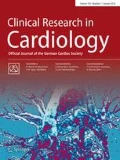Sirs:
Coronavirus disease 2019 (COVID-19), caused by the severe acute respiratory syndrome coronavirus 2 (SARS-CoV-2), is a fast spreading disease with high morbidity and mortality [1]. COVID-19 can contribute to severe myocardial injury, ultimately culminating in acute coronary syndromes (ACS) [2]. Clinical features and outcomes of patients with SARS-CoV-2 associated ACS have not been elucidated, yet.
In a multicenter study, COVID-19 positive patients diagnosed with angiographically confirmed ACS between February 19 and April 9 2020 at 17 sites in Italy, Spain, and Switzerland were compared to COVID-19 negative ACS patients from the University Hospital Zurich. In addition, patients with ST-segment elevation (STE)-ACS COVID 19 positive vs. COVID-19 negative were compared as well as patients with non-ST-segment elevation (NSTE)-ACS COVID-19 positive vs. COVID-19 negative.
Out of 4702 patients with COVID-19, 45 (0.96%) had ACS, of which 27 (60.0%) had STE-ACS and 18 (40.0%) NSTE-ACS. Single vessel disease was present in 25 patients (55.6%) of COVID-19 positive ACS and multi vessel disease in 20 patients (44.4%), respectively. All patients received percutaneous coronary intervention.
COVID-19 positive ACS patients were more likely to present with dyspnea (51.1% vs. 19.7%; P < 0.001) and arterial hypertension (80.0% vs. 51.3%; P = 0.002), while other patients’ characteristics were largely comparable to COVID-19 negative ACS patients (Table 1). Of note, in-hospital mortality was more than 3 times higher in COVID-19 positive ACS patients than in COVID-19 negative ACS patients (27.3% vs. 7.9%; P = 0.004, Table 1). Furthermore, when stratifying patients according to the presence or absence of ST-segment elevation, COVID-19 positive patients with STE-ACS had higher mortality rates compared to COVID-19 negative STE-ACS patients (33.3% vs. 9.3%; P = 0.024) and also COVID-19 positive patients with NSTE-ACS showed numerically higher mortality rates compared to COVID-19 negative NSTE-ACS patients (17.6% vs. 6.1%; P = 0.32). Importantly, 9 out of 12 (75%) deceased COVID-19 positive ACS patients had involvement of multiple organ systems in addition to cardiac manifestations, thus indicating a systemic vascular damage. In comparison to recovered COVID-19 positive ACS patients, deceased COVID-19 positive ACS patients had markedly elevated troponin values (factor increase in upper limit of the normal (ULN): 65.00 vs. 323.00; P = 0.014) and brain natriuretic peptide values (factor increase in ULN: 2.00 vs. 113.23; P = 0.023) accompanied by severely depressed left ventricular ejection fraction (45.3 ± 10.3% vs. 34.3 ± 9.5%; P = 0.003) suggesting incremental SARS-CoV-2 related myocardial injury further aggravating ACS related heart failure.
The relatively low frequency of ACS in COVID-19 may in part explained by the fact that not all COVID-19 positive patients who exhibit ST-segment elevation undergo coronary angiography [3]. The concomitant occurrence of COVID-19 and ACS might be responsible for the increased mortality. Pathophysiological mechanisms underlying COVID-19 related ACS events are unknown but might include acute plaque rupture or erosion facilitated by systemic inflammation, microvascular thrombosis due to hypercoagulability, and/or endothelial dysfunction [4]. The latter is known to play a key role in arterial hypertension and thrombosis and has recently been associated with COVID-19 [5]. In this respect, endotheliitis in COVID-19 might affect various vascular beds thereby increasing the susceptibility for thromboembolic and septic complications or multi-organ-failure [5]. Thus, myocardial ischemia due to ACS might be even aggravated by COVID-19 induced generalized microvascular dysfunction and systemic vascular damage leading to severe heart failure with unfavorable outcomes. Therefore, in addition to a guideline-directed ACS management, therapies to improve endothelial dysfunction might be considered in patients with COVID-19.
References
Huang C, Wang Y, Li X, Ren L, Zhao J, Hu Y, Zhang L, Fan G, Xu J, Gu X, Cheng Z, Yu T, Xia J, Wei Y, Wu W, Xie X, Yin W, Li H, Liu M, Xiao Y, Gao H, Guo L, Xie J, Wang G, Jiang R, Gao Z, Jin Q, Wang J, Cao B (2020) Clinical features of patients infected with 2019 novel coronavirus in Wuhan. China Lancet 395(10223):497–506. https://doi.org/10.1016/S0140-6736(20)30183-5
Shi S, Qin M, Shen B, Cai Y, Liu T, Yang F, Gong W, Liu X, Liang J, Zhao Q, Huang H, Yang B, Huang C (2020) Association of Cardiac injury with mortality in hospitalized patients with COVID-19 in Wuhan, China. JAMA Cardiol. https://doi.org/10.1001/jamacardio.2020.0950
Bangalore S, Sharma A, Slotwiner A, Yatskar L, Harari R, Shah B, Ibrahim H, Friedman GH, Thompson C, Alviar CL, Chadow HL, Fishman GI, Reynolds HR, Keller N, Hochman JS (2020) ST-segment elevation in patients with Covid-19–a case series. N Engl J Med. https://doi.org/10.1056/NEJMc2009020
Madjid M, Safavi-Naeini P, Solomon SD, Vardeny O (2020) Potential effects of coronaviruses on the cardiovascular system: a review. JAMA Cardiol. https://doi.org/10.1001/jamacardio.2020.1286
Varga Z, Flammer AJ, Steiger P, Haberecker M, Andermatt R, Zinkernagel AS, Mehra MR, Schuepbach RA, Ruschitzka F, Moch H (2020) Endothelial cell infection and endotheliitis in COVID-19. Lancet. https://doi.org/10.1016/S0140-6736(20)30937-5
Funding
None.
Author information
Authors and Affiliations
Corresponding author
Ethics declarations
Conflict of interest
The authors report no conflicts of interest.
Rights and permissions
About this article
Cite this article
Cammann, V.L., Szawan, K.A., D’Ascenzo, F. et al. Outcomes of acute coronary syndromes in coronavirus disease 2019. Clin Res Cardiol 109, 1601–1604 (2020). https://doi.org/10.1007/s00392-020-01742-6
Received:
Accepted:
Published:
Issue Date:
DOI: https://doi.org/10.1007/s00392-020-01742-6

